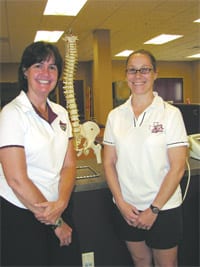The Legal End of Alzheimer’s A Diagnosis Leads to Special Legal, Financial Issues
The diagnosis of Alzheimer’s disease can be heartbreaking for both the person afflicted with the illness and their family members. Alzheimer’s, a common form of dementia, is a brain disorder that seriously affects one’s ability to carry out daily activities. Today, 5.4 million Americans are living with it.
Alzheimer’s disease begins slowly. The most common early symptom of the disease is difficulty remembering newly learned information, because changes usually begin in the part of the brain that affects learning. Over time, the symptoms progressively worsen, and include disorientation; mood and behavior changes; deepening confusion about events, time, and place; unfounded suspicions about family, friends, and professional caregivers; increasingly serious memory loss; and behavior changes, including wandering away from home and difficulty speaking, swallowing, and walking.
Eventually the person will require total care. This can cause great stress on family members and loved ones.
Signs of Alzheimer’s disease may be more apparent to friends and family members because people afflicted may have difficulty recognizing that they have a problem. If one is suspicious of a loved one experiencing Alzheimer’s-like symptoms, it is imperative to have the loved one see a physician as soon as possible.
A diagnosis of Alzheimer’s disease puts a person his family in a position where they face special legal and financial issues. Alzheimer’s planning includes medical and nursing care, housing options, financial management, estate planning, and asset protection, which may include Medicaid planning. All too often, individuals will hesitate on making important decisions because of the slow progression of the disease. This is a mistake, because any delay can prevent that individual’s meaningful input while their cognitive impairments deteriorate.
Early detection of Alzheimer’s disease makes a difference both for the person living with the disease and the caregiver. Early detection enables an individual to:
Plan for the future by making legal, financial and care decisions;
Begin treatment and enroll in clinical studies;
Seek support from others in the same situation; and
Identify community resources that can help.
If a person is diagnosed with early-stage Alzheimer’s disease, they will often have the legal capacity to execute the necessary legal documents to ensure that their wishes are followed. As such, an attorney that specializes in estate planning and elder law should be retained immediately. At a minimum, the legal documents that need to be put in place include a health care proxy for health decisions, a durable power of attorney for financial decisions, and a will for the orderly distribution of assets upon the person’s demise.
Since the average cost of nursing-home care in the Commonwealth of Massachusetts exceeds $10,000 per month, and a person with Alzheimer’s will typically spend more time in a skilled-nursing facility than a person without the disease, it is also critical to discuss long-term-care financing options, which may include Medicaid planning, with the attorney.
In the event that the person can no longer make his or her own health or financial decisions and does not have a valid health care proxy and durable power of attorney, a guardian and/or conservator must be appointed by a court to make decisions. Anyone can petition the court to be a guardian or conservator, and the judge ultimately makes the decision as to who is appointed. The guardian and/or conservator has the legal authority to make decisions regarding the person’s care and finances. This is an expensive, time-consuming, and public process, which may be eliminated by having a health care proxy and durable power of attorney in place, which names the person that you want to serve.
Alzheimer’s is not only a financial drain to those afflicted, but to the Commonwealth of Massachusetts and our nation’s economy. In 2012, the direct costs to American society of caring for those with Alzheimer’s will reach an estimated $200 billion, including $140 billion in costs to Medicare and Medicaid. The average per-person Medicare costs for those with Alzheimer’s and other dementias are three times higher than for those without these conditions. Medicaid spending is 19 times higher. Unless something is done, the costs of Alzheimer’s in 2050 are estimated to total $1.1 trillion in today’s dollars. Costs to Medicare and Medicaid will increase nearly 500{06cf2b9696b159f874511d23dbc893eb1ac83014175ed30550cfff22781411e5}.
Although current Alzheimer’s treatments cannot stop the disease from progressing, they can temporarily slow the worsening of dementia symptoms and improve quality of life for those afflicted and their caregivers. Early diagnosis and intervention methods are improving dramatically. Today, there is a worldwide effort to find better ways to treat the disease, delay its onset, and prevent it from developing. Roughly 90{06cf2b9696b159f874511d23dbc893eb1ac83014175ed30550cfff22781411e5} of what we know about Alzheimer’s has been discovered over the past 15 years. The hope is that this better understanding will lead to new treatments. v
Todd C. Ratner is an estate-planning, business, and real-estate attorney with the Springfield-based law firm Bacon Wilson, P.C. He is a member of the National Academy of Elder Law Attorneys and recipient of Boston Magazine’s 2007-2012 Massachusetts and New England Super Lawyers Rising Stars awards. He also serves as the co-chairperson for the Alzheimer’s Assoc. Tri-County (Hampden, Hampshire, and Franklin) Partnership; (413) 781-0560 ;
tratner@baconwilson.com


Comments are closed.